
GEOCHEMISTRY INTERNATIONAL
Scope & Guideline
Charting New Frontiers in Geochemical Research
Introduction
Aims and Scopes
- Geochemical Analysis of Rocks and Sediments:
The journal publishes studies that analyze the chemical composition and properties of various geological materials, including igneous, sedimentary, and metamorphic rocks, as well as sediments from different environments. - Biogeochemistry and Environmental Geochemistry:
Research on the interactions between biological and geological processes is a key focus, including the impact of human activities on geochemical cycles and the assessment of environmental health through geochemical indicators. - Experimental Geochemistry:
The journal includes experimental studies that simulate geological processes under controlled conditions, providing valuable data on mineral stability, phase relationships, and geochemical behaviors. - Isotope Geochemistry:
Isotopic studies are a significant part of the journal's scope, examining the distribution and ratios of isotopes in various materials to uncover information about geological processes, age dating, and environmental changes. - Geochemical Modeling and Theoretical Approaches:
Theoretical frameworks and computational models that predict geochemical behavior and processes are emphasized, offering insights into complex geological systems.
Trending and Emerging
- Climate Change Impact Studies:
There is a growing emphasis on research that investigates the effects of climate change on geochemical processes, such as changes in sediment composition and biogeochemical cycles, indicating a shift towards addressing global environmental challenges. - Trace Element and Rare Earth Element Geochemistry:
An increase in studies focusing on trace and rare earth elements, particularly in relation to their environmental impacts and resource management, suggests a rising interest in these critical materials. - Geochemical Indicators of Anthropogenic Influence:
Research exploring geochemical markers that reflect human impact on the environment is on the rise, demonstrating a growing concern for pollution, ecosystem health, and sustainability. - Interactions Between Geological and Biological Systems:
Studies examining the interplay between geochemical processes and biological activity, including microbial geochemistry and biogeochemical cycles, are increasingly prominent, highlighting the importance of interdisciplinary research. - Advanced Analytical Techniques in Geochemistry:
The integration of novel analytical methods and technologies in geochemistry, such as high-resolution mass spectrometry and isotopic techniques, is gaining traction, enhancing the precision and scope of geochemical investigations.
Declining or Waning
- Hydrocarbon Geochemistry:
Although hydrocarbon studies remain relevant, there has been a noticeable decrease in papers focused on the geochemistry of hydrocarbons, particularly in relation to oil and gas exploration, compared to previous years. - Paleoclimatic Studies:
Research related to paleoclimatic reconstructions through geochemical proxies has seen a decline, suggesting a shift in focus towards more contemporary environmental issues. - Mineral Deposits and Economic Geochemistry:
Papers specifically centered on the economic aspects of geochemistry, such as mineral deposit evaluations and resource management, have become less frequent, indicating a potential waning interest in this area. - Geochemistry of Volcanic Rocks:
While volcanic studies are still present, the frequency of research focusing on the geochemistry of volcanic rocks and eruptions appears to be diminishing, possibly overshadowed by broader geological and environmental topics.
Similar Journals
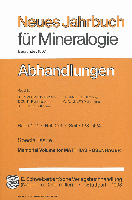
NEUES JAHRBUCH FUR MINERALOGIE-ABHANDLUNGEN
Documenting the evolution of mineralogical research.NEUES JAHRBUCH FUR MINERALOGIE-ABHANDLUNGEN, published by E Schweizerbart'sche Verlagsbuchhandlung in Germany, is a distinguished scholarly journal dedicated to advancing the fields of mineralogy and petrology. With an ISSN of 0077-7757, it provides a platform for researchers to disseminate high-quality findings that contribute to our understanding of Earth sciences. Although it currently has no open access options, the journal remains vital for professionals seeking to engage with impactful research in geochemistry and petrology, as reflected in its 2023 Scopus ranking in the 21st percentile within its category. The journal has documented significant research from 1980 to 1988 and resumed from 1996 to 2023, making it a crucial archive for historical and contemporary studies. Despite its current Q4 quartile ranking, NEUES JAHRBUCH FUR MINERALOGIE-ABHANDLUNGEN is an important contributor to the academic discourse in its field, and it invites researchers, professionals, and students alike to explore and submit their work that drives innovation and understanding in mineralogical studies.
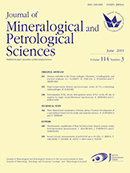
Journal of Mineralogical and Petrological Sciences
Advancing Knowledge in Mineralogy and PetrologyThe Journal of Mineralogical and Petrological Sciences, published by the Japan Association of Mineralogical Sciences, serves as a vital platform for disseminating high-quality research in the fields of mineralogy and petrology. With a presence in both traditional and digital formats (ISSN: 1345-6296; E-ISSN: 1349-3825), this journal fosters scholarly engagement and innovation within these crucial branches of Earth Sciences. As evidenced by its Q3 ranking in both Geology and Geophysics categories for 2023, Journal of Mineralogical and Petrological Sciences maintains a significant standing within the academic community, contributing to the ongoing discourse and exploration of mineralogical phenomena and processes. Researchers, professionals, and students alike will find valuable insights and advancements represented within its pages, with a commitment to inclusivity in research output spanning two decades (2000-2024). Although not currently open access, the journal remains a key resource for understanding the complexities of our geological world.

Geochemical Perspectives Letters
Transforming geochemical research into accessible knowledge.Geochemical Perspectives Letters, published by the European Association of Geochemistry, is a leading open-access journal that has been at the forefront of geochemical research since its inception in 2015. Based in France, this journal is dedicated to disseminating high-quality, original research and reviews across the fields of Environmental Chemistry, Geochemistry, and Petrology, and Geology. With an impressive Q1 ranking in multiple categories, and notable Scopus rankings placing it among the top-tier journals in Earth Sciences, Geochemical Perspectives Letters aims to foster scientific dialogue and collaboration among researchers and professionals. Its open-access model ensures widespread dissemination of knowledge, making it accessible to a diverse audience, including students and seasoned experts alike. As the journal continues to converge research insights from 2015 to 2024, it remains a pivotal resource for those striving to understand and address the complexities of our planet's geochemical processes.
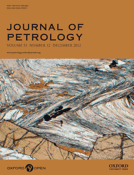
JOURNAL OF PETROLOGY
Exploring the Depths of Geochemistry and PetrologyJOURNAL OF PETROLOGY is a prestigious academic journal published by Oxford University Press, dedicated to the fields of geochemistry, petrology, and geophysics. Established in 1960, it has garnered significant recognition within the scientific community, currently holding an impressive Q1 ranking in both Geochemistry and Petrology as well as Geophysics, as of 2023. The journal is indexed in Scopus, ranking 20th out of 165 in Geophysics and 31st out of 154 in Geochemistry and Petrology, reflecting its high impact and contribution to Earth and Planetary Sciences. Designed for researchers, professionals, and students, the journal publishes cutting-edge research and reviews that advance our understanding of igneous and metamorphic processes, mineralogy, and the Earth's structure. With a commitment to rigor and scientific excellence, JOURNAL OF PETROLOGY serves as a vital resource for developing new concepts and methodologies in the study of Earth’s materials and processes.
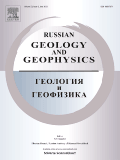
Russian Geology and Geophysics
Pioneering Insights in Russian GeosciencesRussian Geology and Geophysics is a seminal journal published by GEOSCIENCEWORLD that plays a pivotal role in the dissemination of vital research within the realms of Earth-Surface Processes, Geology, and Geophysics. With an ISSN of 1068-7971 and an E-ISSN of 1878-030X, this journal has witnessed a continuous evolution since its convergence in 2007 and is poised to thrive through 2024. While it is not an Open Access journal, it is recognized for its significant contributions to the academic community, holding a respectable Q2 ranking in Earth-Surface Processes and Q3 rankings in both Geology and Geophysics as of 2023. The journal’s impact factors align it within competitive quartiles, marking it as an essential resource for researchers and professionals seeking to stay at the forefront of geological and geophysical sciences. By publishing high-quality peer-reviewed articles, the journal fosters an environment of knowledge sharing and innovation, making it indispensable for students, practitioners, and scholars alike who are dedicated to advancing our understanding of Earth's complex systems.
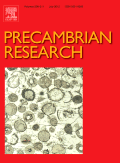
PRECAMBRIAN RESEARCH
Pioneering Research in the Age Before Complex LifePRECAMBRIAN RESEARCH is a leading peer-reviewed journal published by Elsevier, dedicated to advancing the field of Earth sciences, with a specific focus on the study of the Precambrian era. With its distinguished Q1 ranking in both Geochemistry and Petrology and Geology, this journal plays a critical role in disseminating high-impact research, thus contributing to its impressive standing, ranked in the top percentages in Scopus for related fields. Founded in 1974, the journal has evolved continually, ensuring comprehensive coverage of geological aspects spanning from geochemical processes to petrological studies. Researchers and students alike will find this journal indispensable for accessing cutting-edge findings, methodologies, and innovative perspectives essential for understanding the Earth’s formative years. Although it does not provide an open-access option, its subscription provides a gateway to a wealth of knowledge and groundbreaking research pivotal for scholarly advancements leading up to 2024.
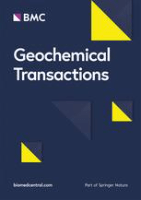
GEOCHEMICAL TRANSACTIONS
Pioneering Open Access Research in GeochemistryGEOCHEMICAL TRANSACTIONS is an esteemed journal dedicated to the field of geochemistry and petrology, published by BMC in the United Kingdom. As a pioneer in open access publishing since its inception in 2000, the journal facilitates widespread dissemination of research findings to ensure that critical advancements in geochemical sciences are accessible to both academia and industry. With an impressive Scopus ranking of 62 out of 154 in the Earth and Planetary Sciences category, GEOCHEMICAL TRANSACTIONS holds a reputable position, reflected by its Q3 categorization within the influential quartiles, capturing the interest of its target audience. The journal aims to publish high-quality research articles, comprehensive reviews, and discussions that address contemporary challenges and advancements in geochemistry. Researchers, professionals, and students will find this journal an invaluable resource for staying up-to-date with the latest developments and fostering collaboration within the scientific community.

EARTH AND PLANETARY SCIENCE LETTERS
Unveiling Earth's Secrets Through Rigorous ResearchEARTH AND PLANETARY SCIENCE LETTERS, published by ELSEVIER, stands as a premier academic journal in the fields of Earth and Planetary Sciences, Geochemistry and Petrology, Geophysics, and Space and Planetary Science. Since its inception in 1966 and continuing to 2024, the journal has consistently maintained an impressive reputation, ranking in the top quartile (Q1) across several categories, highlighting its vital role in advancing scholarly research. With a Scopus ranking of #4 in both Geophysics and Geochemistry and Petrology, and a notable 97th percentile in multiple Earth sciences categories, EARTH AND PLANETARY SCIENCE LETTERS provides a platform for groundbreaking research, encouraging rigorous investigation and dissemination of knowledge. While not available as an Open Access publication, the journal remains highly accessible to academics and professionals worldwide, providing invaluable insights and fostering discussions that influence the future of Earth sciences. Whether you are a researcher, educator, or student, this journal is a crucial resource for understanding our planet and its processes.
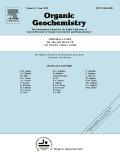
ORGANIC GEOCHEMISTRY
Innovating Understanding in Organic GeochemistryORGANIC GEOCHEMISTRY, published by PERGAMON-ELSEVIER SCIENCE LTD, is a pivotal journal in the field of geochemistry and petrology, dedicated to the exploration of organic compounds and their interactions within geological systems. Established in 1977, this journal has been an influential medium for researchers, providing significant insights and advancements that have shaped the understanding of organic geochemistry. With an impressive impact factor and a distinguished ranking of Q2 in its category, it sits at the forefront of academic research, currently holding the 46th position out of 154 in Earth and Planetary Sciences according to Scopus, which places it within the top 70th percentile. Although it operates on a subscription basis, ORGANIC GEOCHEMISTRY is recognized for its rigorous peer-review process, ensuring that only the highest quality research is published. Its scope includes an array of critical topics, appealing to geochemists, petrologists, students, and professionals looking to deepen their knowledge and contribute to this dynamic field. With converged publications extending into 2024, the journal continues to play a crucial role in the dissemination of cutting-edge research that addresses global challenges such as environmental change and resource management.

Journal of Volcanology and Seismology
Illuminating the Forces that Shape Our PlanetThe Journal of Volcanology and Seismology, published by PLEIADES PUBLISHING INC, serves as a pivotal platform for disseminating innovative research in the fields of volcanology and seismology. With an ISSN of 0742-0463 and an E-ISSN of 1819-7108, this journal aims to contribute to the understanding of geological processes, providing insights that are essential for both academic inquiry and practical applications in hazard management and environmental conservation. The journal spans from 2007 to 2024 and holds a respectable position in the academic community, classified within the Q3 quartile across key categories including Geochemistry and Petrology, Geology, and Geophysics. Despite the absence of an open access model, the journal remains highly relevant, ranking in the 34th Percentile for Geology and the 33rd Percentile for Geophysics, reflecting its commitment to quality and rigor. Researchers, professionals, and students are encouraged to engage with this resource to enhance their understanding and contribute original findings to the ever-evolving disciplines of Earth sciences.